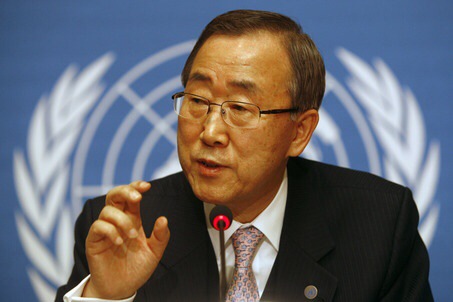Al Wefaq National Islamic Society commended Mr. Ban Ki Moon’s remarks at the Security Council open debate on Security Sector Reform on Monday 28th, April 2014.
Mr. Ban Ki Moon stated, “The purpose of security sector reform, simply put, is to make people’s lives safer.
“The legitimate authority to use force comes with a corresponding responsibility to protect and respect human rights. A professional and accountable security sector under the framework of the rule of law can strengthen public confidence in the State and provide the stability necessary for peace building and development.
Al Wefaq emphasizes on Mr. Ban Ki Moon’s statement where he said, “Security institutions that lack the right training or adequate governance and oversight mechanisms may fail to provide basic security or even violate the rights of the very people they are entrusted to protect”.
The political crisis in Bahrain
Al Wefaq pointed out that Bahraini Authority has “misused” the State-security forces in the country’s political crisis “in support of narrow political and sectarian interests, with destabilizing effects”, as Mr. Ban Ki Moon highlighted to have happened in other countries.
Mr. Ban Ki Moon hit the core of the truth when he stated, “The pressing need to extend State authority and ensure public safety and the rule of law”, and this certainly does not go with the “dissolution of the security institutions”. Mr. Ban Ki Moon has declared a noble goal “to help States build professional security institutions solidly anchored in a culture of service, rather than an unchecked and unaccountable exercise of power and force”.
Al Wefaq added that the Bahraini authority’s experience in the security reform, by issuing the police code of conduct, the decision to organize the use of force and constructing new institutional structures, has not changed anything on ground. While all these measures were taken in implementation of the recommendations of the Bahrain Independent Commission of Inquiry (BICI), the martyr Abdulazziz Alabbar has lost his life due the security forces’ excessive use of force.
The statement made by the Interior ministry over the deportation of Ayatollah Najati included sectarian persecution language, violating the Code of Conduct.
The prisoners in Jau prison continue to appeal to the international community over the ill-treatment and assaults they are subjected to. The prisoners have been on hunger strike for several days now. However, the State’s National Institution for Human Rights, commissioner of prisoners and detainees, the ombudsman office, the general inspector’s office and other State-institutions remain silent over the consecutive reports of degrading mistreatment.
All this stresses the principle of “Strengthening operational effectiveness must be combined with efforts to build a strong governance framework, robust accountability and oversight mechanisms, and a culture of integrity and respect for human rights”, as stated by Mr. Ban Ki Moon. Nonetheless, Al Wefaq stresses that training for security services that lack integrity and a human-rights-respecting-doctrine turns into a method to escape accountability. Today, the Bahraini authorities are refusing to admit the true reason of Alabbar’s death.
Al Wefaq emphasizes on the remarks made by the UN Secretary-General Mr. Ban Ki Moon, and reiterates its calls to reform the security system into diversified security services that respect human rights and provide safety and security for all. The authority, however, continues to ignore the opposition parties’ vision and initiatives for reform. Indeed, “The sight of an officer in uniform should evoke feelings of order, discipline and security”.
In Bahrain, however, the Interior minister clearly threatened that anyone who talks about torture will be challenged by the judiciary. Human rights defenders are constantly harassed, while some remain behind bars.
Al Wefaq calls on Mr. Ban Ki Moon to closely follow the Bahraini situation. Al Wefaq looks to a genuine reform in cooperation with the institutions and foundations of the UN.
Citizens of a certain religious belief in the Bahraini society do not feel secure and safe, even in the exercise of religious rituals. Their religious belief and relation with their spiritual reason are considered reasons for repression, thus, the security services are indeed “misused in support of narrow political and sectarian interests, with destabilizing effects”.
Finally, Al Wefaq said it looks for a security system that is based on the protection of rights and freedoms for all. A security system that integrates all Bahrainis and protects citizens from authorities’ oppression. Security services must not be used in sectarian persecution, division, and repression of dissidents.
/149

